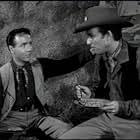Hugh Beaumont starring in this film might surprise many viewers today. After all, he's known to most as the sweet father of the Beaver on "Leave it to Beaver". However, before he appeared on this show, he appeared in many B-movies...many of which are crime films. He often played private detectives, though he sometimes played villains or cops...hardly the Ward Cleaver sorts of characters! Here in "Danger Zone" he plays a cheap private eye.
When the story begins, Dennis (Beaumont) is at an auction when a woman approaches him and begs him to be the highest bidder for an unopened suitcase. He agrees and wins it for $1000....a princely sum for 1951. But after buying it, the lady disappears and Dennis takes the case home. After opening it, he finds there's just a sax inside...and soon the losing bidder shows up to buy the sax. But before Dennis can make a deal, he gets slugged...and awakens much later. Why?? Why did the guy slug him and why did the lady insist he buy it?
Now all this sounds very interesting, right? Well, that's only HALF the movie. As it consisted of a couple TV episodes edited together to make a full-length film, there's a second story.
In this second part, Dennis is hired to use one of his boats to take some socialite to a party on a yacht anchored off shore. It's an odd job...and it's not surprising that just like the sax, there is MUCH more to the story...including murder and Dennis being left holding the bag!
The oddest thing for me isn't seeing Beaumont in such a role but seeing Eddie Brophy as "the Professor'...an overly erudite guy with a strong penchant for the bottle. Seeing and hearing him talking like some out of work Oxford professor was indeed odd, as he normally played a dopey New York hood or the like.
So is it good? Well, it's not bad but it also feels rushed. Stretching out each story into its own movie would have helped. I mostly recommend it because of its interest as a curio...evidence that Beaumont was more than just some nice-guy TV dad.



























